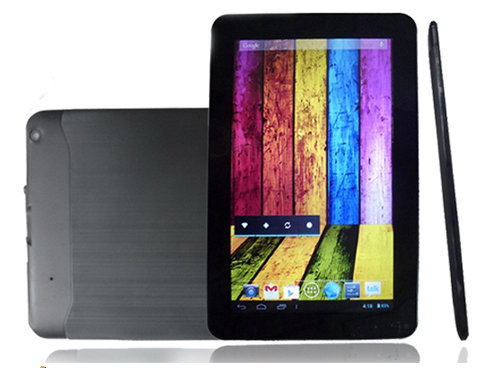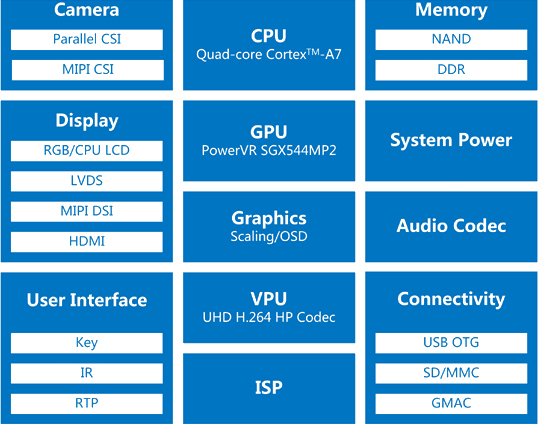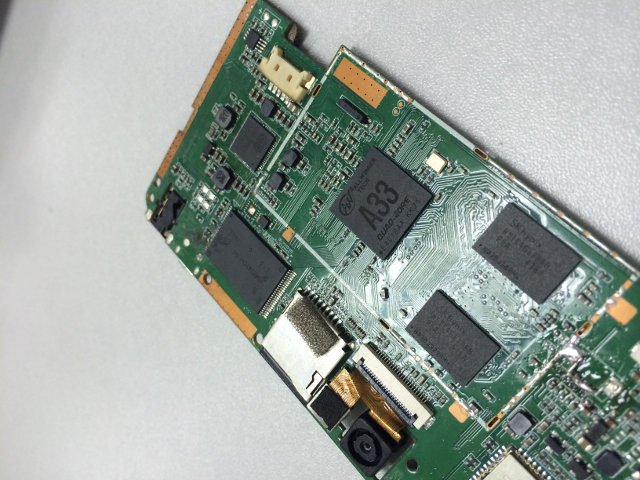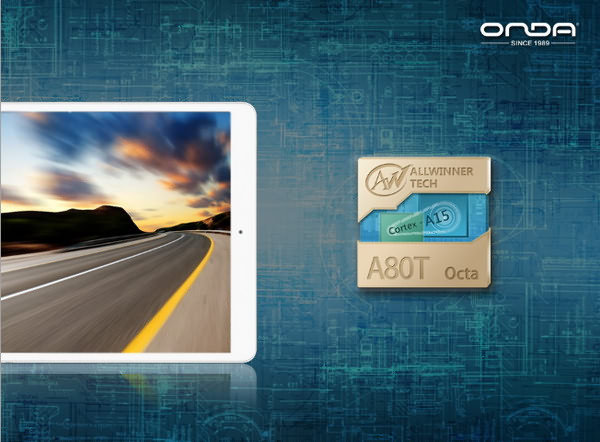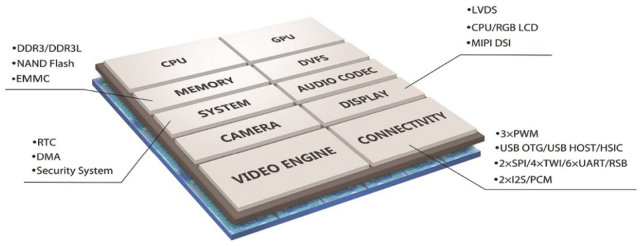AllWinner A33 is a new quad core Cortex A7 processor pin-to-pin compatible will AllWinner A23 dual core processor, that costs less than $5 with the power management IC (AXP223). Tablets based on the new processor are now available for sale, and just as low as $60 including shipping on Aliexpress. All models currently listed feature 9″ to 10″ displays, so it’s safe to expect 7″ tablets to be close to $50. Let’s check the specs of one of the no-name 9″ tablets currently available: SoC – AllWinner A33 quad core Cortex A7 processor @ 1.3 GHz (Overclocked to 1.5GHz???) with Mali-400MP2 GPU System Memory – 512MB RAM Storage – 8GB NAND FLASH + microSD card slot (Up to 32GB) Display – 9″ capacitive touch screen (800 x 480 pixels, 5 points touch) Connectivity – 802.11 b/g/n Wi-Fi and Bluetooth. 3G is supported via external 3G USB dongle. Camera – 0.3M […]
Onda V989 AllWinner A80 Android Tablet is Now Available for Pre-order
AllWinner A80 octa-core big.LITTLE has been delayed several times, but it appears products based on the latest AllWinner application processor can finally be pre-ordered. One of them is Onda V989, an Android 4.4 tablet with a 9.7″ 2048 x 1536 pixel display, 2GB RAM and 32GB flash, that’s supposed to reach over 48,000 in Antutu, but actually gets a little over 32,000 points in Antutu X. Onda V989 tablet specifications: SoC – AllWinner A80T octa core bit.LITTLE processor with 4x ARM Cortex A7 cores @ ?? GHz and 4x ARM Cortex A15 cores @ 2GHz, and PowerVR G6230 GPU System Memory – 2GB DDR3 Storage – 32GB NAND flash + micro SD/SDHC slot (up to 128GB) Display – 9.7″ IPS display with 10-point capacitive touchscreen, 2048 x 1536 resolution Video Output – micro HDMI (up to 1080p) Audio I/O – Stereo speakers, built-in microphone, 3.5mm earphone jack, and HDMI Connectivity […]
AllWinner V10 and V15 SoCs Target Video Recording Applications
AllWinner A-series that can be found in tablets and media players are pretty well known, but AllWinner also has V-Series processors with V10 and V15. A first glance, AllWinner V10 is quite similar to AllWinner A31 with a quad core Cortex A7 CPU coupled with a PowerVR SGX544MP2 GPU, and AllWinner V15 has the same CPU/GPU combo as AllWinner A10 (CortexA8/Mali-400). But AllWinner V-Series are actually video encoders targeting applications such as IP cameras, car DVRs, and sports digital video cameras thanks to features such as motion detection, video scaling, and digital watermarking. Let’s go through AllWinner V10 specifications, and I’ll mark differences with AllWinner A31, or features not mentioned in A31 specs, in bold: CPU – Quad-core ARM Cortex-A7 with· 256KB L1 cache, 1MB L2 cache GPU – PowerVR SGX544MP2 compliant with OpenCL 1.1 EP and delivering up to 20GFLOPS. Memory – 32-bit DDR3/LPDDR2 SDRAM controller, supporting up to […]
AllWinner A33 Quad Core Processor to Cost $5 With PMIC, Tablets Starting at $40
With their latest A33 SoC, Allwinner may have put a nail in the coffin of dual core application processor for tablets, as Eva Wu, AllWinner’s Marketing Manager, has just released some pricing info, and AllWinner A33 with AXP223 PMIC (Power Management Integrated Circuit) reference price is only $4.99, paving the way for ultra cheap quad core Android tablets. I’ve also been given some estimates for (factory) prices for different tablet’s types powered by AllWinner A33: About $40 for 7″ tablets (800×480) with 1GB DDR3, and 8GB Flash. About $45 for 7.85″ tablets (1024×768) with 1GB DDR3, and 8GB Flash. About $50 for 8″ tablets (1280×800) with 1GB DDR3, 8GB Flash. With four ARM Cortex A7 cores, a Mali-400MP2 GPU, and limited display resolutions, you won’t get an amazing user experience, but for a first tablet, or a kid’s tablet, it looks pretty good value. I estimate that Chinese stores may […]
Onda V989 Tablet Powered by AllWinner A80T Achieves Close to 50,000 Points in Antutu
Teclast T97 was one the first tablet based on AllWinner A80, an octa-core CortexA15/A7 big.little processor with PowerVR G6230 GPU. It was announced way too early last December… There’s now another tablet much closer to an actual retail availability called Onda V989 featuring AllWinner A80T with a 9.7″ display and 2 or 4 GB RAM that come close to the top of the Antutu scoreboard with 48102 points. Unfortunately that’s all we know about this tablet at this stage. I’m not sure what A80T means, AllWinner A80 Tablet version?, or AllWinner A80 Turbo, with higher clock frequencies? There has also been some sort of silly season with benchmark related to AllWinner A80 with scores ranging from 23674 to 48102 points in Antutu as shown below for Onda V989. The low score was achieved when A80’s Cortex A15 cores were allegedly clocked at 1.2GHz , but it should be closer to […]
AllWinner A33 Quad Core SoC is Pin-to-Pin Compatible with AllWinner A23
Allwinner has just announced a new quad cortex ARM Cortex A7 SoC for entry-level Android tablets. AllWinner A33 shares many of the features of AllWinner A23 dual core Cortex A7, including an ARM Mali-400MP2 GPU, and provides pin-to-pin compatibility, with the main difference being the upgrade from two to four Cortex A7 cores. The company has already disclosed the main specifications of their new SoC: CPU – Quad core ARM Cortex A7 with 256 KB L1 Cache, 512KB L2 cache GPU – ARM Mali-400MP2 with support for OpenGL ES 2.0/VG 1.1 standards Memory DDR3/DDR3L SDRAM controller 8-bit NAND/eMMC flash controller Video Decoding – 1080p60 video playback for MPEG-1/2, MPEG 4 SP/ASP GMC, H.263, H.264, WMV9/VC-1, VP8, and more Encoding – 1080p60 for H.264 Complies with RTSP, HTTP, HLS, RTMP, MMS streaming protocols Supports OpenMAX API Display 1 to 4 lane MIPI DSI up to 1280×800 RGB/CPU/LVDSLCD up to 1280×800 Camera – […]
ARM Cortex A15/A17 SoCs Comparison – Nvidia Tegra K1 vs Samsung Exynos 5422 vs Rockchip RK3288 vs AllWinner A80
We’re now starting to get quite a few players with ARM Cortex A15 cores on the market, as well as some with ARM Cortex A17. So a comparison table of different quad and octa SoCs might be a useful thing to do. I’ve put aside SoCs such as HiSilicon K3V3, and OMAP5, and focused on the four latest processors: Nvidia Tegra K1 (32-bit), Samsung Exynos 5422, Rockchip RK3288 and AllWinner A80. I haven’t included Mediatek MT6595 and Qualcomm SnapDragon 805, because the two companies mainly focus on smartphones and tablets (although it appears to be slowly changing for Qualcomm), documentation is usually difficult or impossible to find, and in the case of Qualcomm they use their own ARMv7 Krait cores. I’ve highlighted some features in green, in case a particular SoC appears to have an edge. Rockchip RK3288 AllWinner A80 Nvidia Tegra K1 Samsung Exynos 5422 CPU 4x ARM Cortex-A17 […]
VidOn.me Updates XBMC Source Code for their AllWinner A20 and A31 based Android Media Players
Just at the end of last year, VidOn.me released XBMC apks for their AV100 and AV200 media players, respectively powered by AllWinner A20 and AllWinner A31 SoCs. The company already had an XBMC repository on github, but at the time it hadn’t been updated for a year. Things have changed since then, as they’ve committed several changes, some of them related to AllWinner SoCs to their XBMC repository. I haven’t look into details, but it could be VidOn.me is now in compliance with the GPLv2 license which XBMC is licensed under. If the code is complete, another “side effect” could be there’s finally support for AllWinner A20 (and A10) for XBMC Android. Previsouly, some people tried the AV100 APK on other AllWinner A10/A20 devices, but it did not work, most probably because they locked the binary to their devices, something that would be more difficult to do if the code […]


